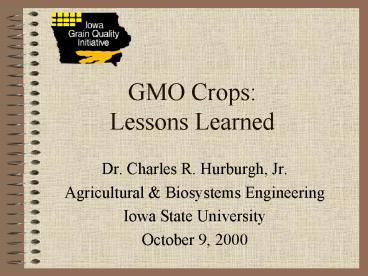GMO Crops: Lessons Learned - PowerPoint PPT Presentation
1 / 16
Title:
GMO Crops: Lessons Learned
Description:
A few consumers and processors (if output traits) Researchers ... Sampling error similar to aflatoxin. 5-10 lb sample. rough grind and divide. Tolerances ... – PowerPoint PPT presentation
Number of Views:21
Avg rating:3.0/5.0
Title: GMO Crops: Lessons Learned
1
GMO Crops Lessons Learned
- Dr. Charles R. Hurburgh, Jr.
- Agricultural Biosystems Engineering
- Iowa State University
- October 9, 2000
2
Who Has Been Affected by GMO Crops?
- Biotechnology companies and suppliers
- Producers
- A few consumers and processors (if output traits)
- Researchers
3
Who Has Been Affected by the GMO Issue?
- Biotechnology companies and suppliers
- Producers
- Handlers
- Food manufacturing chain
4
Who Has Been Affected by the GMO Issue?
- Consumers
- Media
- Activists
- Testing labs, other support services
- Exports, educators, researchers
5
GMO Crops Lessons Learned
Consumers can care about raw commodities
- Any perception of change will be negative
- Any perceived risk is more risk than they had
before - With no clear benefit, responses will be negative
- The Precautionary Principle
6
GMO Crops Lessons Learned
Consumers can care about raw commodities
- Value is utility, a perceived level, not purely
cost - Consumers do not have to be consistent
- Consumers may value the process as much as the
product
7
GMO Crops Lessons Learned
Success in segregating products means organized
supply chains, not random trading
- Segregation without incentives is unlikely
- Full segregation is costly (50/bu)
- A slightly enhanced commodity is not a good
product for segregation - Certification or testing
- Success stories
8
Grain Handling Practices Non-GMO Markets (Feb.
2000)
9
Grain Analysis Practices Non-GMO Markets (Feb.
2000)
10
GMO Crops Lessons Learned
Do not expect what you cannot inspect
- New products must have verification, tests
available - Split or partial approval trouble
- Inspection/testing must have neutral standards
- Certification (ISO, etc.) is a partial but not
complete substitute - Testing methods
11
GMO Testing
- Polymerase Chain Reaction (PCR)
- DNA test, precise
- 3-5 days, 300/sample
- Immunoassay (ELISA)
- antibody indicator, screening
- 5-20 minutes, 3-10/sample
- NIR under test
- near-infrared, screening
- 1-2 minutes, 2-4/sample
12
GMO Testing
- Sampling
- 25-50 error - single kernel event
- Sampling error similar to aflatoxin
- 5-10 lb sample
- rough grind and divide
- Tolerances
- Market uncertain
- Most estimates 1-5
- Accumulation of mixing errors
- original seed, field
- harvesting
- handling and storage
- shipment
13
GMO Testing
14
GMO Crops Lessons Learned
Producers do not have to support all biotechnology
- Technology cost treadmill
- Competitors can specialize, avoid the costs of
segregation - Any marketing risk is more risk than producer has
now - More cautious, demanding in the future GMO
forced them to learn about the entire market
15
Summary How High Was The Tuition?
- Consumers can care about raw commodities
- Success in segregating means organized supply
chains, not random trading - Do not expect what you cannot inspect
- Producers do not have to support all
biotechnology
16
Where To Find Us
www.iowagrain.org































